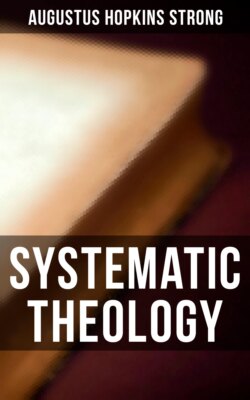Читать книгу Systematic Theology - Augustus Hopkins Strong - Страница 69
На сайте Литреса книга снята с продажи.
I. Genuineness of the Christian Documents.
ОглавлениеTable of Contents
The Genuineness of the Christian Documents, or proof that the books of the Old and New Testaments were written at the age to which they are assigned and by the men or class of men to whom they are ascribed.
Our present discussion comprises the first part, and only the first part, of the doctrine of the Canon (κανών, a measuring-reed; hence, a rule, a standard). It is important to observe that the determination of the Canon, or list of the books of sacred Scripture, is not the work of the church as an organized body. We do not receive these books upon the authority of Fathers or Councils. We receive them, only as the Fathers and Councils received them, because we have evidence that they are the writings of the men, or class of men, whose names they bear, and that they are also credible and inspired. If the previous epistle alluded to in 1 Cor. 5:9 should be discovered and be universally judged authentic, it could be placed with Paul's other letters and could form part of the Canon, even though it has been lost for 1800 years. Bruce, Apologetics, 321—“Abstractly the Canon is an open question. It can never be anything else on the principles of Protestantism which forbid us to accept the decisions of church councils, whether ancient or modern, as final. But practically the question of the Canon is closed.” The Westminster Confession says that the authority of the word of God “does not rest upon historic evidence; it does not rest upon the authority of Councils; it does not rest upon the consent of the past or the excellence of the matter; but it rests upon the Spirit of God bearing witness to our hearts concerning its divine authority.”Clarke, Christian Theology, 24—“The value of the Scriptures to us does not depend upon our knowing who wrote them. In the O. T. half its pages are of uncertain authorship. New dates mean new authorship. Criticism is a duty, for dates of authorship give means of interpretation. The Scriptures have power because God is in them, and because they describe the entrance of God into the life of man.”
Saintine, Picciola, 782—“Has not a feeble reed provided man with his first arrow, his first pen, his first instrument of music?” Hugh Macmillan: “The idea of stringed instruments was first derived from the twang of the well strung bow, as the archer shot his arrows; the lyre and the harp which discourse the sweetest music of peace were invented by those who first heard this inspiring sound in the excitement of battle. And so there is no music so delightful amid the jarring discord of the world, turning everything to music and harmonizing earth and heaven, as when the heart rises out of the gloom of anger and revenge, and converts its bow into a harp, and sings to it the Lord's song of infinite forgiveness.” George Adam Smith, Mod. Criticism and Preaching of O. T., 5—“The church has never renounced her liberty to revise the Canon. The liberty at the beginning cannot be more than the liberty thereafter. The Holy Spirit has not forsaken the leaders of the church. Apostolic writers nowhere define the limits of the Canon, any more than Jesus did. Indeed, they employed extra-canonical writings. Christ and the apostles nowhere bound the church to believe all the teachings of the O. T. Christ discriminates, and forbids the literal interpretation of its contents. Many of the apostolic interpretations challenge our sense of truth. Much of their exegesis was temporary and false. Their judgment was that much in the O. T. was rudimentary. This opens the question of development in revelation, and justifies the attempt to fix the historic order. The N. T. criticism of the O. T. gives the liberty of criticism, and the need, and the obligation of it. O. T. criticism is not, like Baur's of the N. T., the result of a priori Hegelian reasoning. From the time of Samuel we have real history. The prophets do not appeal to miracles. There is more gospel in the book of Jonah, when it is treated as a parable. The O. T. is a gradual ethical revelation of God. Few realize that the church of Christ has a higher warrant for her Canon of the O. T. than she has for her Canon of the N. T. The O. T. was the result of criticism in the widest sense of that word. But what the church thus once achieved, the church may at any time revise.”
We reserve to a point somewhat later the proof of the credibility and the inspiration of the Scriptures. We now show their genuineness, as we would show the genuineness of other religious books, like the Koran, or of secular documents, like Cicero's Orations against Catiline. Genuineness, in the sense in which we use the term, does not necessarily imply authenticity (i.e., truthfulness and authority); see Blunt, Dict. Doct. and Hist. Theol., art.: Authenticity. Documents may be genuine which are written in whole or in part by persons other than they whose names they bear, provided these persons belong to the same class. The Epistle to the Hebrews, though not written by Paul, is genuine, because it proceeds from one of the apostolic class. The addition of Deut. 34, after Moses' death, does not invalidate the genuineness of the Pentateuch; nor would the theory of a later Isaiah, even if it were established, disprove the genuineness of that prophecy; provided, in both cases, that the additions were made by men of the prophetic class. On the general subject of the genuineness of the Scripture documents, see Alexander, McIlvaine, Chalmers, Dodge, and Peabody, on the Evidences of Christianity; also Archibald, The Bible Verified.
